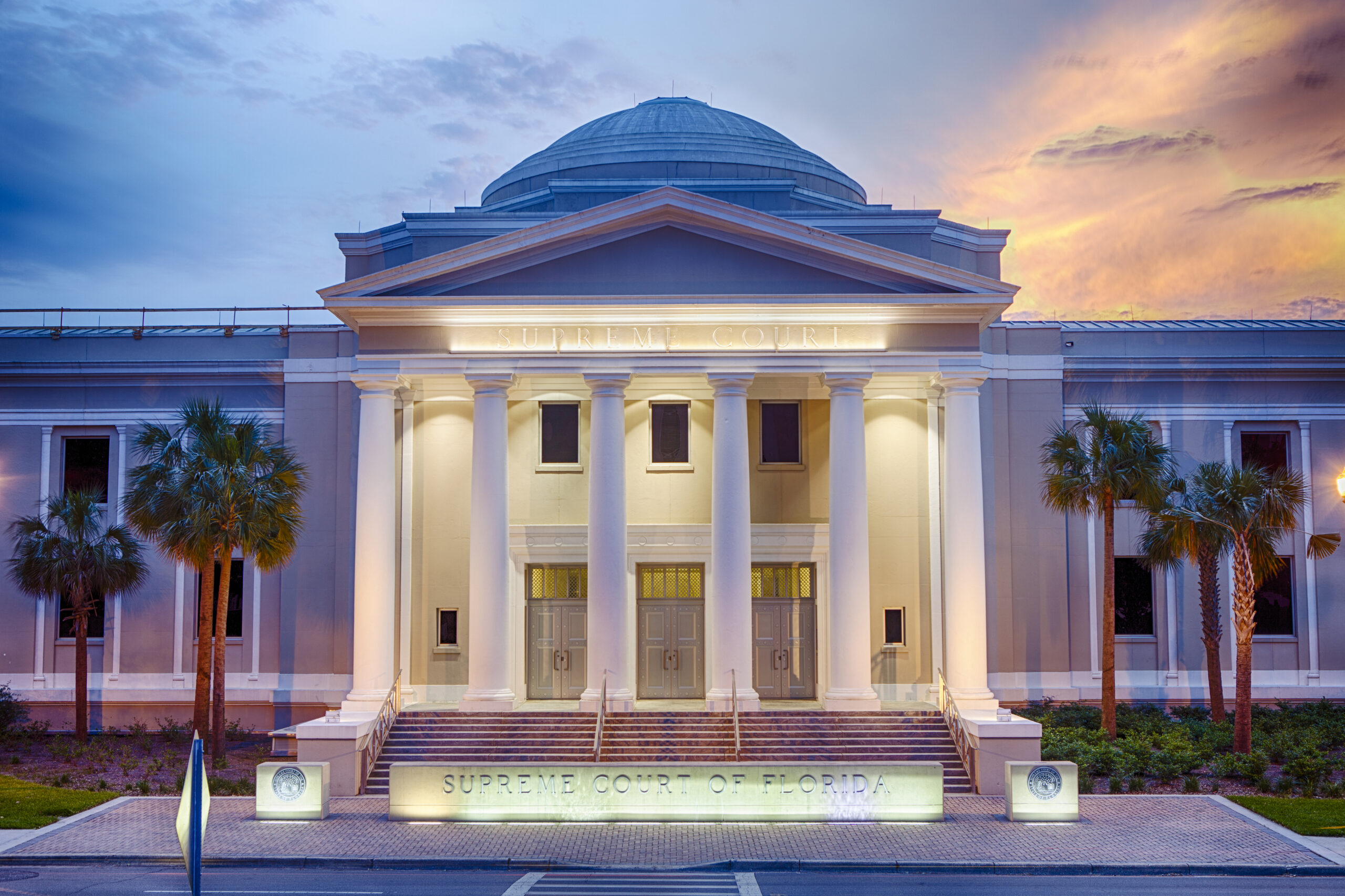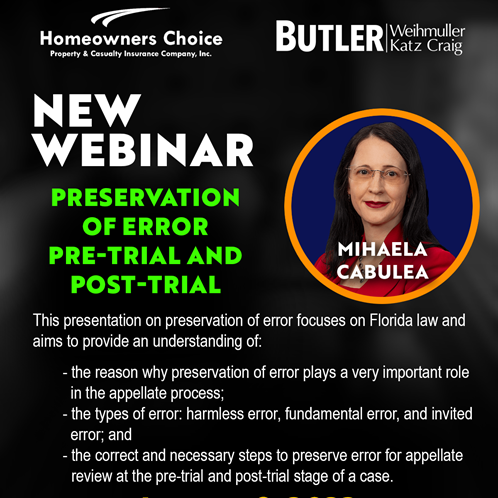
July 8, 2015
This article was originally published in the Florida Bar Journal, © Copyright 2015. All rights reserved. Republished by Butler with permission.
Litigating a case through trial and appeal is expensive. At the end of the day, your client has likely expended a significant sum on various litigation costs. If you lost at trial, but prevailed on appeal, can you recover your costs? What if you prevailed on your cross-appeal, but lost most of the issues in the main appeal? What if you won at trial, but now the judgment has been reversed on appeal for “further proceedings”? If there is no right to attorneys’ fees, a client’s recovery of his or her taxable costs following a successful appeal at least provides some consolation. This article answers some of the common questions and sets forth the governing law and requirements for obtaining an award of appellate costs.1
Who May Recover Appellate Costs?
Fla. R. App. P. 9.400 states that costs “shall” be awarded to the prevailing party “unless the court orders otherwise.” 2 The trial court generally has no discretion to deny an award of taxable costs to the party that prevailed.3 Thus, the main issue for the trial court in ruling on entitlement to appellate costs is determining who “prevailed” on appeal. And this inquiry is strictly limited to the appeal. It is of no matter that the party may ultimately lose in the trial court on remand.4 The trial court must determine who won on the significant issues on appeal.5 Generally, this is a fairly straightforward inquiry. In some cases, especially involving multiple parties and cross-appeals, determining who prevailed on the significant issues on appeal can be difficult. In Markin v. Markin, 953 So. 2d 13 (Fla. 4th DCA 2007), the Fourth District Court of Appeal reversed an order awarding appellate costs to the former husband following an appeal from a final judgment of dissolution of marriage. Even though the former husband obtained a credit of $1.2 million for post-judgment alimony as a result of his appeal, the appellate court found that, in the grand scheme of the case, the issue was relatively insignificant. As explained by the court, he was “merely given a credit” for amounts already paid and his obligations under the final judgment were not reduced.6 Thus, even though he prevailed on a single issue that, considered in isolation, may appear significant, he was not the “prevailing” party on the overall significant issues on appeal.
Exceptions have been found even when the party clearly prevailed. In General Capital Corp. v. Tel Service Co., 239 So. 2d 134, 136 (Fla. 2d DCA 1970), the Second District affirmed a trial court’s taxing of appellate costs against the successful appellant when victory was obtained only because of intervening legislation. Further, as observed by the Third District Court of Appeal, appellate costs do not automatically “follow the judgment.” In Varveris v. Carbonell, 785 So. 2d 576, 577 (Fla. 3d DCA 2001), the court reversed a costs award to the appellant when the case was remanded only for the purpose of serving the appellant with process — not dissolving the challenged injunction.7 In some cases, the trial court may properly determine that no party “prevailed” on appeal.8 In sum, who “prevailed” on appeal is not always readily discernible. Be prepared for a challenge if the opposing party prevailed on a single material issue on appeal, or if you are the appellant, and the final judgment was left largely undisturbed.9
How Do I Recover my Appellate Costs?
The procedures for obtaining an award of appellate costs are governed by Florida’s appellate rules. Under Rule 9.400, the lower tribunal — not the appellate court — is the court authorized to tax appellate costs.10 In order to obtain an award of appellate costs, a motion must be served on the parties to the trial court proceedings no later than 45 days from the rendition of “the court’s order.”11
The “court’s order” referred to in Rule 9.400 is the decision or opinion of the appellate court at the conclusion of the appeal. Under the rule, a party must serve his or her motion to tax appellate costs within 45 days of “rendition” of the appellate court’s opinion.12 As any seasoned appellate practitioner knows, the rendition of an order is important. It starts the clock running on critical appellate deadlines. The 45—day period referred to in Rule 9.400 may be tolled if a timely motion for rehearing is filed that would delay rendition of the appellate court’s order or opinion until a ruling on the rehearing motion. As the rule only requires that the motion to tax appellate costs be served “no later than” 45 days after the appellate court’s order, it is probably prudent to serve your motion as soon as practicable after the decision. The deadline for moving to tax appellate costs is jurisdictional and, thus, a late filing cannot be remedied by the trial court or by the parties.13 Of course, the parties can agree to waive appellate costs by stipulation.14
Rule 9.400 previously required that a motion to tax appellate costs be filed within 30 days of the issuance of the appellate court’s mandate. Under the previous version of the rule, if a party mistakenly filed the motion in the appellate court, it would be denied without prejudice to the party filing a proper motion to tax appellate costs with the trial court upon issuance of the mandate.15 Under the new rule, as amended effective January 1, 2015, the deadline to file a motion to tax appellate costs runs from the rendition of the appellate court’s opinion without regard to the issuance of the mandate.16 If a party mistakenly files in the appellate court, the 45 days could run before the party realizes the mistake if the appellate court delays ruling on the motion, another reason to file any motion promptly that has a jurisdictional deadline. Mistakes happen that cannot be corrected.
What Appellate Costs Are Recoverable?
Rule 9.400 specifies the costs recoverable on appeal. These costs are 1) fees for filing and service of process; 2) charges for preparation of the record and any hearing or trial transcripts necessary to determine the proceeding; 3) bond premiums; and 4) other costs permitted by law.17 As noted herein, a trial court generally does not have discretion to disallow any of the enumerated recoverable costs once the court determines that there is a “prevailing” party. The court does have discretion as to the amount of the award. In American Medical International Inc. v. Scheller, 484 So. 2d 593 (Fla. 4th DCA 1985), the Fourth District affirmed a trial court’s ruling reducing the prevailing party’s recovery of supersedeas bond premiums. The amount was reduced based on evidence that the bond premium was so high because of multiple briefing extensions. In Florida Power & Light Co. v. Polackwich, 705 So. 2d 23, 26 (Fla. 2d DCA 1997), the Second District suggested that if a supersedeas bond was unnecessary, that this cost may not be recoverable. Thus, if the opposing party agrees not to execute the final judgment during the pendency of the appeal, or was never contacted to find out if collections would ensue, there is an argument that the cost of a supersedeas bond was unnecessary.
Similarly, the trial court may determine that the costs of preparing the appellate record should be apportioned or shared when both parties prevailed on significant issues and sought to challenge the judgment.18 If there were portions of the record that were only necessary to a cross-appeal, the party that lost that appeal will likely bear those costs.19 Again, the trial court has broad discretion in determining whether there is, in fact, a single prevailing party, and how the appellate costs should be apportioned.
The party seeking recovery of appellate costs must also show that the amounts sought were actually incurred.20 For example, theoretical lost interest on a cash bond is not a recoverable taxable cost under Rule 9.400.21
Subsection (4) of Rule 9.400 allows recovery of “other costs permitted by law.” This subsection allows the legislature to expand the recoverable appellate costs as it deems proper.22 It was recently interpreted to allow for reimbursement of a court registry fee. In Miccosukee Tribe of Indians of South v. Bermudez, 155 So. 3d 489, 491 (2014), a trial court’s order awarding a court registry fee in the amount of $71,961.59 as a taxable appellate cost was challenged. The court registry fee was deposited with the clerk of court to stay collection efforts during the pendency of the underlying appeal. The Third District noted that depositing money with the clerk is one of the two methods for posting a bond specifically authorized by Rule 9.310(c)(1), which defines a “good and sufficient bond” as either “a bond with a principal and a surety company authorized to do business in the State of Florida” or “cash deposited in the circuit court clerk’s office.”
The appellee argued that the court registry fee did not fall within the category of “bond premiums” under Rule 9.400(a)(3). The Third District, however, did not consider that issue but focused instead on whether the court registry fee fell within “other costs permitted by law” as authorized by subsection (4). The court noted that “by law” means “by enactment of the Florida Legislature.” As the legislature has provided by law that costs include, “[t]he reasonable premiums or expenses paid on all bonds or other security furnished by such party,” the recovery of these costs was permitted under subsection (4).23 The court observed that it was unable to discern any reason why the Florida Rules of Appellate Procedure would provide two methods for posting a bond, yet allow recovery of only the costs of paying the fee charged by a private surety, but not the statutorily required fee charged by the clerk.
Do I Have to Wait Until the Conclusion of Proceedings Upon Remand to Recover My Appellate Costs?
No. Appellate costs should be awarded without regard to the status of the proceeding upon remand because the costs are awarded based on the appeal — not what happens when the case is returned to the trial court.24 An order awarding costs is immediately executable.25
How Do I Support or Object to an Award of Appellate Costs?
A party is entitled to notice and an opportunity to be heard before appellate costs may be imposed.26 A motion seeking to tax appellate costs should be supported by evidence verifying the nature of the costs incurred and the amounts actually incurred. Although not specifically required by the rules, a statement of the costs incurred with the appropriate invoices verifying same should be submitted with the motion to tax costs. Practically speaking, the costs must be identified and itemized to allow the trial court to make the proper award, and to provide the opposing party notice and an opportunity to object. If the parties stipulate as to the amounts due, an agreed order awarding the costs may be submitted.
If appellate costs are awarded along with other fees and costs, it is good practice to provide the trial court with a proposed order properly allocating the costs. Otherwise, if the allocation does not appear on the face of the order, it is subject to reversal.27 The burden is on the party challenging the allocation of the appellate costs to clearly demonstrate that the trial court erroneously allocated the costs.28 If you can foreclose this challenge at the outset, all the better.
How Do I Challenge the Trial Court’s Ruling?
A challenge to a trial court’s order either granting or denying a motion to tax appellate costs is by motion filed with the appellate court within 30 days of rendition of the trial court’s order.29 The appellate court will review the matter under the abuse of discretion standard.30 If the trial court failed to award appellate costs falling within the enumerated categories set forth in Rule 9.400, the order will likely be reversed as the award of such costs is mandatory to a prevailing party. But, as set forth herein, if reasonable persons could differ as to whether one party “prevailed” on appeal, or there was an evidentiary basis for reducing the amount awarded, the order will likely be affirmed.
Conclusion
An award of appellate costs is not automatic and should not be taken for granted. You must prevail on the significant issues on appeal and timely serve your fully supported motion in the trial court. A hearing must be scheduled if you cannot reach an agreement with opposing counsel. And if an order is entered granting your motion, make sure the allocation is clear as to the appellate costs awarded. You can execute the costs award immediately. If you lose on remand, that bad news will at least follow some money obtained from your successful appeal.
1 Attorneys’ fees are not considered a taxable cost. See Price v. Taylor, 890 So. 2d 246 (Fla. 2004). Thus, the recovery of appellate attorneys’ fees is not within the scope of this article. This article is also limited to the recovery of appellate costs in Florida state courts in general civil appeals at the district court level.
2 See Fla. R. App. P. 9.400(a) (2015).
3 In Fla. Power & Light Co. v. Polackwich, 705 So. 2d 23, 25 (Fla. 2d DCA 1997), the Second District noted that “unless the court orders otherwise” language provides the appellate court the discretion to grant a motion for rehearing following an appellate opinion and order that appellate costs not be taxed. The court noted that such a scenario would present “a very unusual case.”
4 See Centennial Mortgage, Inc. v. SG/SC, Ltd., 864 So. 2d 1258, 1260 (Fla. 1st DCA 2004) (ruling that an award of costs after a successful appeal may not be conditioned upon the ultimate outcome of the case); Osterback v. L.E. Turner, 855 So. 2d 1237, 1238 (Fla. 1st DCA 2003) (ruling an award of costs under Rule 9.400(a) does not depend on a party’s ultimate success on the merits of a claim).
5 See Moritz v. Hoyt Enterprises, Inc., 604 So. 2d 807, 810 (Fla. 1992) (defining the “prevailing party” for purposes of attorneys’ fees and costs as “the party prevailing on the significant issues”).
6 Malkin, 953 So. 2d at 15.
7 Judge Cope dissented, disagreeing that the trial court abused its discretion in ruling that the appellant, Varveris, was the prevailing party on appeal. Judge Cope noted that before the appeal, the appellee, Carbonell, had a foreclosure judgment ordering that Varveris’ property be sold. Even though the appellate court left a temporary injunction in place, “[t]he real issue on the prior appeal was whether Varveris’ real estate would be sold.” The court reversed because Carbonell had not obtained personal jurisdiction over Varveris. As Carbonell now had to “start over,” Judge Cope stated that Varveris was the prevailing party on appeal. This case illustrates the difficulty in determining the “prevailing party” when each side has technically “won” on certain issues. See also Newton v. Tenney, 122 So. 3d 390, 392 (Fla. 4th DCA 2013) (noting that in some contract cases there may be compelling circumstances in which trial court could find that neither party prevailed, but here the defendant prevailed on the significant issues).
8 See James v. James, 675 So. 2d 683, 684 (Fla. 3d DCA 1996); Ariko v. Nicholson, 632 So. 2d 174 (Fla. 5th DCA 1994); Phares v. Cowles, 459 So. 2d 1110, 1113 (Fla. 4th DCA 1984) (“In the absence of an ability to identify with a relative degree of certainty just who the prevailing party might be, it would be inappropriate to assess costs.”).
9 See Thaller v. Waterford Point Condominium Apartments, Inc., 437 So. 2d 248 (Fla. 4th DCA 1983) (quashing trial court’s order awarding appellate costs when judgment was affirmed on all claims with exception of principal and interest due to condominium association).
10 See Giddens v. Tlsty, 98 So. 3d 257 (Fla. 1st DCA 2012).
11 An appellate order is not deemed “rendered” if a timely and authorized motion is filed. See Fla. R. App. P. 9.020(j) (2015) (“If any timely and authorized motion under [R]ule 9.330 or 9.331 is filed, the order shall not be deemed rendered as to any party until all of the motions are either withdrawn or resolved by the filing of a written order.”).
12 There is no need to plead or otherwise request an award of appellate costs prior to filing this motion. See generally First Protective Ins. Co. v. Featherson, 978 So. 2d 881, 884 (Fla. 2d DCA 2008) (noting everyone that litigates is “on notice” that costs are at issue).
13 See Mulato v. Mulato, 734 So. 2d 477, 478 (time requirements for motion pursuant to Rule 9.400 are jurisdictional).
14 See State ex rel. Meredith v. Cone, 177 So. 545 (1937).
15 See Cornerstone Residential Management, Inc. v. Dogoirand, 993 So. 2d 529 (Fla. 3d DCA 2008); Bernstein v. New Beginnings Trustee, LLC, 2 So. 3d 346, 347 (Fla. 4th DCA 2008).
16 See In Re: Amendments to the Florida Rules of Appellate Procedure, 2014 WL 5714099 at *19 (Nov. 6, 2014).
17 Fla. R. App. P. 9400(a) (2015).
18 See Florida Power & Light Co. v. Polackwich, 705 So. 2d 23, 25 (Fla. 2d DCA 1997).
19 Id.
20 See Lone Star Industries, Inc. v. Liberty Mutual Ins. Co., 688 So. 2d 950, 952 (Fla. 3d DCA 1997) (ruling that Liberty Mutual’s mere “paper transfer” of funds on its balance sheet from its claim department to its surety department for the purposes of procuring a supersedes bond was not a “cost” within meaning of Rule 9.400(a)(3)).
21 See Rehman v. ECC International Corp., 707 So. 2d 752, 753 (Fla. 5th DCA 1998).
22 Philip J. Padovano, 2 Florida Appellate Practice §22:3 (2015).
23 Id. (citing Fla. Stat. §57.071(1)(a) (2014)).
24 See L.J. Johnson v. Jarvis, 107 So. 3d 428, 430 (Fla. 1st DCA 2012) (finding that while the assessment of attorneys’ fees may be deferred until the determination of a prevailing party on remand, the assessment of costs is not likewise deferred); see also Bernstein v. Newe Beginnings Trustee, LLC, 2 So. 3d 346, 347 (Fla. 4th DCA 2008); Lucas v. Barnett Bank of Lee County, 732 So. 2d 405, 406 (Fla. 2d DCA 1999); Di Teodoro v. Lazy Dolphin Development Co., 432 So. 2d 625, 626 (Fla. 3d DCA 1983).
25 See Swan v. Wisdom, 392 So. 2d 987 (Fla. 5th DCA 1981) (ruling it was error not to make order awarding successful appellant certain appellate costs subject to execution prior to outcome of new trial); Di Teodoro, 432 So. 2d at 626 (error to deny immediate execution of cost judgment).
26 See Alexis v. State, 12 So. 3d 1281, 1282 (Fla. 4th DCA 2009) (ruling that a party is entitled to notice and an opportunity to be heard before appellate costs are imposed).
27 See Coleman v. Bland, 152 So. 3d 752, 754 (Fla. 5th DCA 2014) (reversing trial court order for further proceedings in which trial court’s order failed to specify whether the award applied to appellate attorneys’ fees, appellate costs, or post-mandate attorneys’ fees at the trial court level).
28 See General Capital Corp. v. Tel Service Co., 239 So. 2d 134, 136 (Fla. 2d DCA 1970).
29 See Fla. R. App. P. 9.400(c) (2015).
30 See General Capital Corp., 239 So. 2d at 135—36.
Carol M. Rooney is a partner and appellate practitioner with Butler Weihmuller Katz Craig in Tampa and is board certified in appellate practice. She devotes her practice to civil appeals in federal and state courts and to providing appellate support to trial lawyers handling complex commercial litigation.



